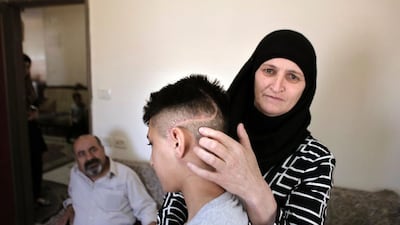JERUSALEM // Ahmed Abu Al Homs’s life changed forever in January when he became caught up in clashes between Palestinians and Israeli police while en route to see his sister.
The 13-year-old was hit by an Israeli anti-riot bullet during the clashes in east Jerusalem, leaving him in a coma for 45 days. When he came out of it, a piece of his skull was gone.
“Before, Ahmed was an intelligent boy, lively and dynamic,” his uncle Mehdi Al Homs said of the Palestinian teenager, whose head still bears scars and stitches.
“Now all he can do is walk, and not for very long. He has difficulty expressing himself and remembering things.”
Ahmed is among the Palestinians wounded by a new type of anti-riot bullet that Israeli police began using around two years ago, rights groups say.
While not designed to be lethal, the sponge-tipped bullet’s ability to inflict heavy damage has raised concern. Israeli police regularly use such bullets during clashes in mainly Palestinian east Jerusalem.
In January 2015, police were given the authorisation to use what is known as bullet model 4557 in east Jerusalem, said Nesrine Aliane, a lawyer with the Association for Civil Rights in Israel.
Capsule-like in shape, the bullets have a hard plastic base and a rounded tip covered in hard black foam.
Some six centimetres long and three centimetres wide, they are heavier than the previous model used.
While official authorisation did not come until January 2015, police had in fact been using them since July 2014 as violence escalated and eventually led to that year’s war on the Gaza Strip, said Ms Aliane.
More than 30 Palestinians in east Jerusalem have been wounded since police began using them, most suffering head injuries. Fourteen have lost an eye.
As for Ahmed, he can no longer read or write and spends most of his time in his family’s home in the Issawiya neighbourhood of east Jerusalem.
In September 2014, 16-year-old Mohammed Sonoqrot died from his wounds after being hit by one of the bullets on August 31.
“He is dead because he was hit with a bullet in the head fired from very close range,” Ms Aliane said.
ACRI says Israeli police closed the case in May without charging anyone, citing a lack of evidence.
Rights groups say that while they are supposed to be non-lethal, there are risks related to how the bullets are used.
Fired at the legs from at least 10 metres away, the bullets cause severe pain, but are not supposed to leave permanent damage.
“The problem is that they are being used in ways that are irresponsible,” said Sari Bashi of Human Rights Watch.
“What we see in east Jerusalem is that police are using an excess of force – unnecessary force against demonstrators – and they are failing to take precautions to protect civilian demonstrators, especially children.”
Israeli police spokeswoman Luba Samri said police always acted “in compliance with the law and principles of self-defence”.
When using weapons designed to be non-lethal such as the sponge-tipped bullets, it is done “reasonably, with moderation” and while seeking to cause the least damage possible, she claimed.
However, Nafez Al Damiri, 55, paid dearly for finding himself in the wrong place at the wrong time in July 2015, as clashes broke out at east Jerusalem’s Shuafat refugee camp, where he lives.
The deaf man was frightened and sought shelter in a grocery store. Surveillance video shows him being hit in the face with an anti-riot bullet, leaving him with fractures and a glass eye.
He had previously worked as a tailor, but no longer leaves his home. His wife Ghada said she has had to give up her work as a house cleaner to take care of her husband.
* Agence France-Presse

